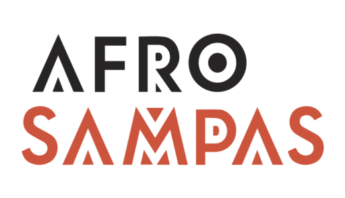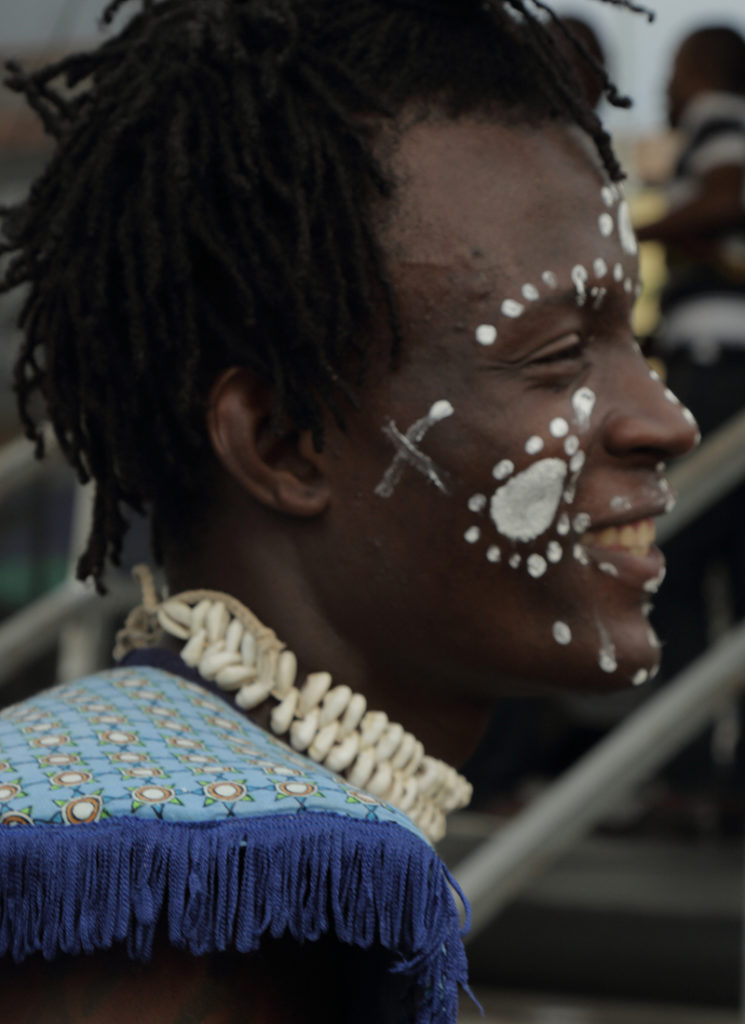
Edoh Amassize
Grupo Maobé
Togolese artist born in 1989, living in São Paulo since 2015. In Ewe, the most widely spoken language in Togo, Edoh means “born after twins”, and he was indeed conceived after his mother had a pair of twins before him. He began his artistic career at the age of 8, playing percussion instruments at parties and family ceremonies.
At 13 he was invited to join the Ballet Sitsope as a percussionist, where he stayed for 8 years and travelled to neighbouring countries like Ghana, Benin and Côte d’Ivoire, participating in festivals and competitions. He performed for 4 years in the Ballet Lex Lionceaux, with whom he made several presentations around the country. He also performed in national ballets – Tche Tchoula, Kobama, Alokpa, Kekeli, Amlima, Hembiesso, Cofaf – with whom he traveled on tours to Tunisia, Morocco and Libya, of the Gazo group, with which he traveled to France and with the Atopani group, with whom he also traveled on tour to Latin American countries such as Paraguay, Peru, Bolivia, Ecuador and Colombia. At the end of this tour, he went to Brazil at the invitation of a friend. Here he joined Grupo Esperança with some Togolese countrymen, and performed at various events, such as the Cultural Turn, the São José dos Campos Culture Festival, several SESCs and others.
In 2017 he founded the folk group Maobe, which is made up of Togolese, Brazilians and occasionally Guinean artists. The group has performed in SESCs, sarais, schools, and has been portrayed in documentaries on immigration and African culture. Maobe is a word in Yoruba that means “don’t look back, don’t care about the envious”, “banish envy”. The group brings the rich culture of Togo with its traditions, customs and peculiarities, portrayed through percussive rhythms and dances: rites, ceremonies, war dances, planting, harvesting, births, death, weddings, among other moments in the daily life of the Togolese people, also mentioning the traditions and dances of Benin, Ghana, South Africa, Guinea Conakry and more. The group brings art and African ancestry to Brazil, spreading its culture.
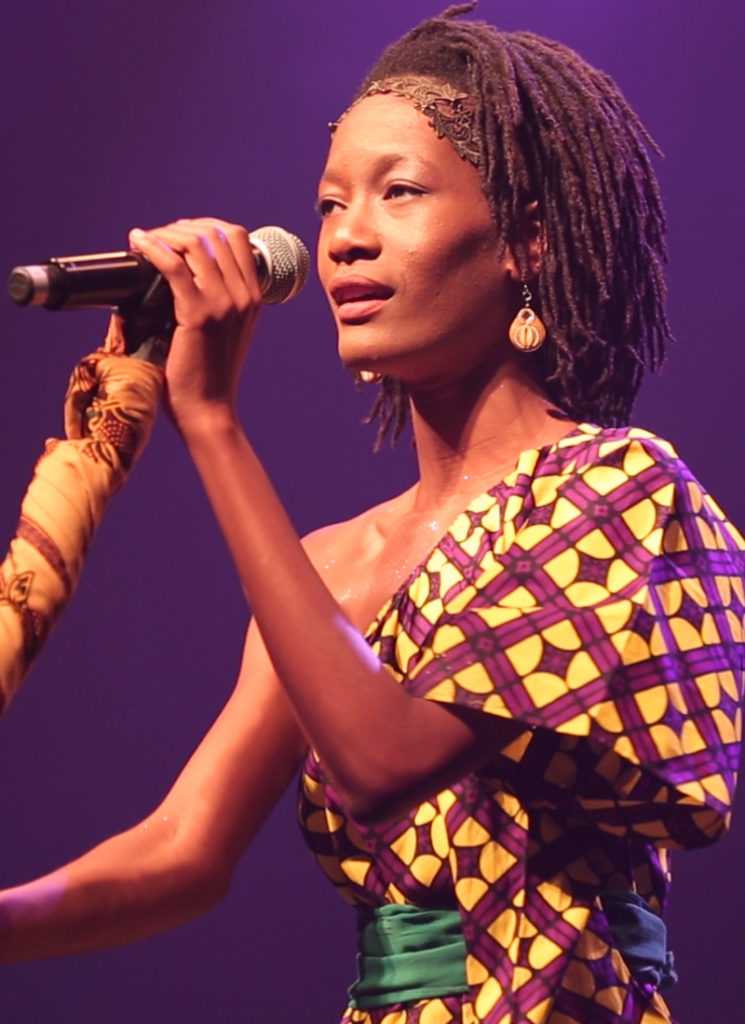
Lenna Bahule
Singer, art educator and cultural activist, born in 1989 in Maputo, Mozambique. Today she travels between Brazil and her native country to constantly research and exchange with the cultures and social movements of both places. In Brazil, Lenna based her research on vocal music and different paths for the use of voice and body as a musical instrument and artistic expression. Her musical career includes national and international performances and partnerships with Mario Laginha (Portugal), Hamilton de Hollanda (Brazil), Mû Mbana (Guinea Bissau), Manecas Costa (Guinea Bissau), Luizinho do Jeje (Brazil), Virginia Rodrigues (Brazil), Benjamim Taubkin (Brazil), Paulo Flores (Cape Verde), Luedji Luna (Brazil), Luiz Tatit (Brazil) and the fellow writer Mia Couto among many others.
Currently, her artistic works are focused on two musical projects: the NÔMADE project, eponymous with her first album, voted among the 100 best albums produced in Brazil in 2016, which has aesthetics of vocal music from research in Mozambique and that has female bodies and voices on the front lines of the arrangements; and the duo TAUBKIN & BAHULE, in partnership with the São Paulo based bassist, João Taubkin, with whom she launched a live album in 2018. Lenna has also been working as an educator since 2013, facilitating and conducting activities related to group singing, body, voice and movement and the repertoire of popular culture in Mozambique (games and popular songs). She is also Ambassador for the SOMOS MOZAMBIQUE cause, which came together to support the victims of the two cyclones that hit the center and north of the country in early 2019, in partnership with Connecting Dots and the Red Cross.
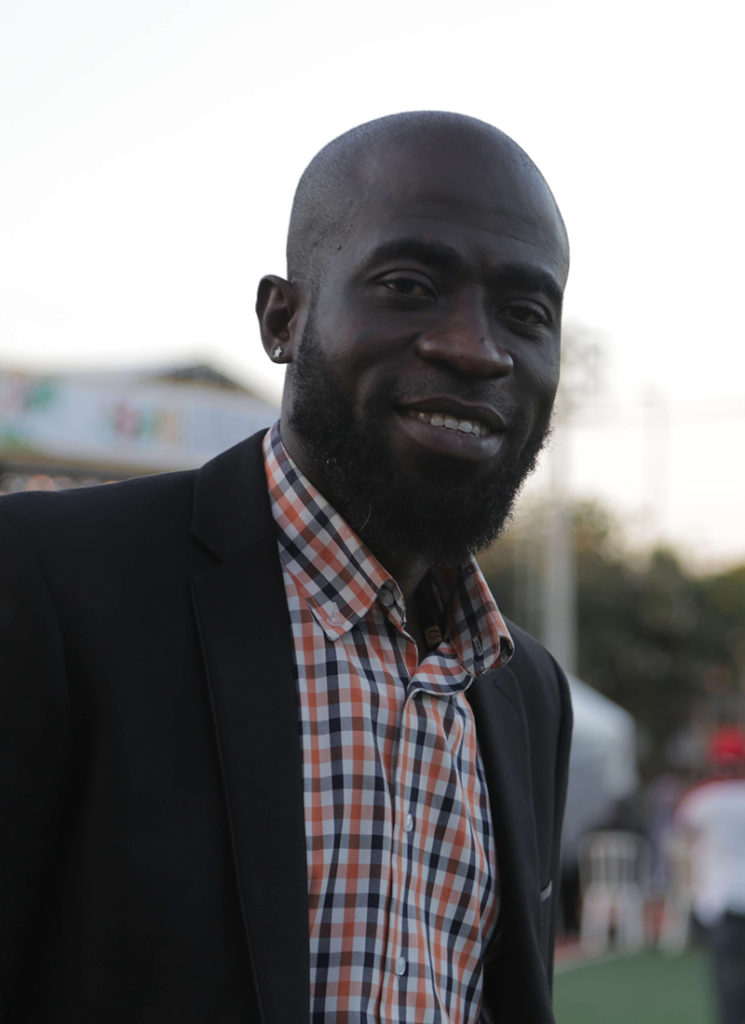
Shambuyi Wetu
https://shambuyiwetu.wixsite.com/portfolio
Congolese artist, born in 1973, living in São Paulo since 2014. Shambuyi means “father of twins”. Shambuyi prefers to use a name in his language than Gauthier, the “French” name he received at birth. He’s a refugee. He left twin sons in Kinshasa, the capital of the Democratic Republic of Congo, where he was born. Shambuyi studied arts at the Beaux-Arts Academy in Kinshasa. He is defined as an Artist with a capital “A”. His sculptures, paintings and performances address various themes involving the narratives and experiences of the diaspora and the situation of the black in the world.
He has performed at several events in the city of São Paulo, such as at the 20th Contemporary Art Festival Sesc_Videobrasil (2017), at Galeria Mezanino (2017), at Sesc Belenzinho and Vila Mariana (2017), Museum of Immigration (2018), Sesc Sorocaba, Sesc Ipiranga, Sesc Taubaté, Sesc Pompeia (2019), Fábrica de Cultura (2019) and Coletivo Digital (2019), and also in other cities and states, such as Ceará, in Sesc Juazeiro do Norte (2019), and in the Center of Arts at the Regional University of Cariri (2019).
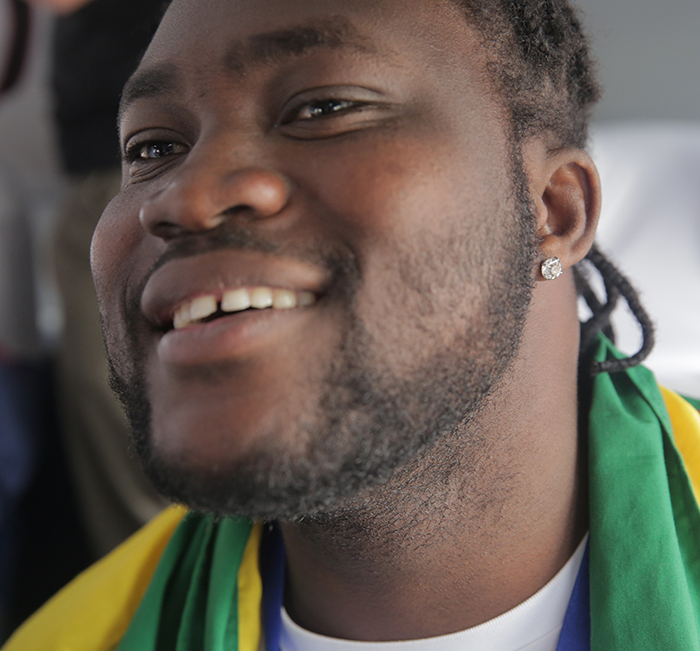
Sassou Espoir Ametoglo
Togolese dancer and choreographer, born in 1987, living in São Paulo since 2014. He left a son in Togo, and has a son and a daughter in Brazil.
Sassou started dancing at the age of eight, and graduated in dance and traditional arts from Togo, Benin and Ghana. He participated in several festivals, was part of the group N’Tifafa and in 2010 became the technical director of the group A.T.A.C. He was secretary and technical director of the Tchetchoula group, with which he toured China, and of the groups Dagbéneva and Kpalimé, in which he was also a master choreographer.
In São Paulo, he founded the Esperança group in 2016, with the participation of Togolese and Guinean artists. The group performed at SESCs Pompeia, Belenzinho, Campo Limpo, 24 de Maio, in soirees, and in schools.
Sassou is now a member of the Maobé group, and has performed at several Sescs and ‘Fábrica de Cultura’. Maobé also offers Togolese dance and music classes and workshops.
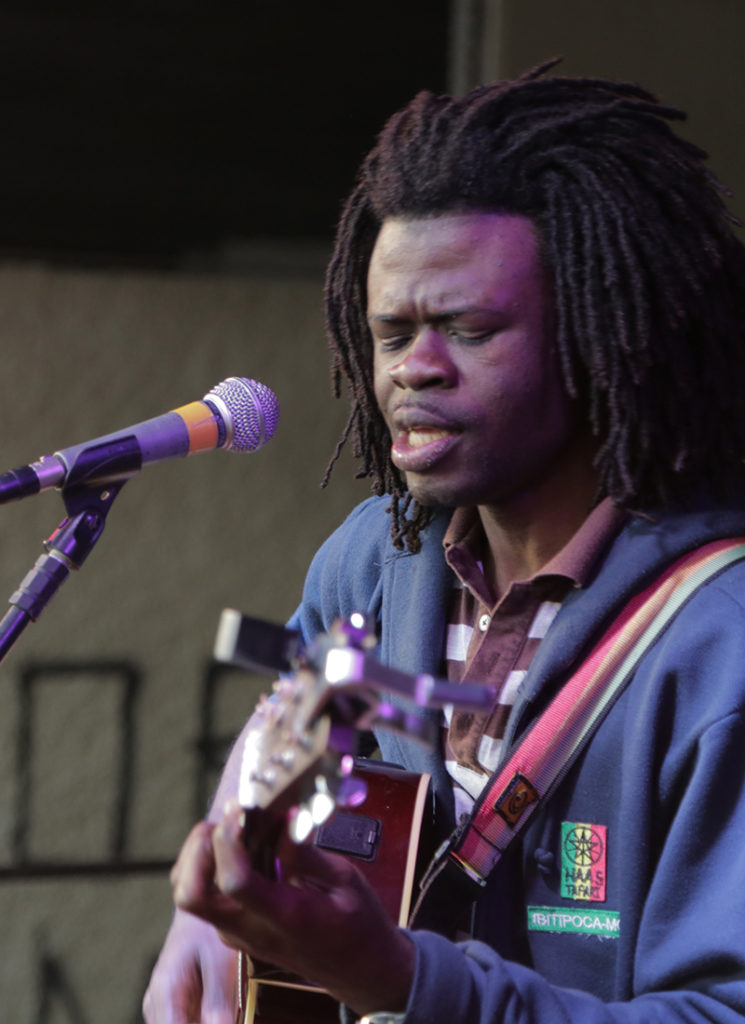
Yannick Delass
Congolese singer, songwriter and guitarist, born in 1984. Yannick began his career at the age of seven in a religious choir in the Democratic Republic of Congo, where he graduated in singing and musical harmony at the Reveil Du Salut centre. Subsequently he joined bands that contributed to his musical evolution such as “FTR Music” in Congo and “Banda da Ilha” in São Tomé and Príncipe.
At the age of 20 he left the Democratic Republic of Congo to see the world and live off his engaged music. He performed in Gabon, South Africa, Indonesia, São Tomé and Príncipe, Cape Verde and Brazil, where since 2016 he has settled definitively.
He participated in various musical projects: Homage to the first lady of Gabon “Edith Bongo” and “Música de Zuntamon” (UNESCO, São Tomé and Príncipe), besides participating in the albums of Pepe Lima, Timmy Djone, Os Descendentes (São Tomé and Príncipe) , Ozavino (Gabon), Freitas Tubila (DRC) and Emílio Martins (Brazil).
Yannick, has already performed alongside musicians with national and international recognition such as Chico César, Luedji Luna, Bira Reis, Léo Bazico, Gerônimo (Brazil), Lokua Kanza (Congo), João Seria (São Tomé and Príncipe) and Nicolas (Chile) ).
In a solo career, he produced three albums, the album “Stop” in 2013, recorded between Gabon, Democratic Republic of the Congo and São Thomé and Príncipe, “Outros Rios” in 2015 developed in partnership with the violeiro from Minas Gerais Juliano Botti and his last album, “Espoir (Hope)” launched in 2017, a project of authorial compositions, dealing with themes such as racial equality, social justice, imperialism, immigration and struggles, in which African compositions and arrangements are performed by Brazilian musicians.
He developed his solo career internationally, performing at various events and festivals. In São Thomé e Príncipe Yannick participated in “Cacau Jazz” in 2012, Concerto Luanda Suave e Frenética, “Festival Gravana”, “Twenty Years of Gala of TVS”, “Festival of Francophony” in 2013 and the “International Biennial of São Tomé and Príncipe” 2013-2014. In Cape Verde he played at the Show da Manhã in 2014, 2015 and 2016 and at Quintal da Música in 2016.
In Brazil, he performed at the “Festival of Black Art” in Belo Horizonte in 2015, he was the winner of the “V Festival of Music and Poetry of the Immigrant” in 2016 and participated in the “VII World Social Forum on Migration” in the same year. He performed at the “Bienal Sesc de Dança”, at the “Musiques D’Afrique Festival”, at Virada Cultural and at MasterChef in 2017. In 2018 he was in Ceará for the Festival Cordas Ágio in Cariri and in Brasília for the Festival Internacional Republica Blues. In the same year, he participated in the II Edition of the Gringa Music Festival and the Pinheiros Festival (São Paulo). He started 2019 playing at the Cobra Cantagalo Festival in Paraty-RJ and at the Sesc Cultural Show at Crato.
In addition to his concerts at festivals, Yannick Delass has performed in a different format in the Sesc circuit, as well as performing at Jazz nos Fundo, Olido Cultural Center, Francisca’s House, Mario de Andrade Library, Youth Cultural Center, among others. He is the creator and curator of the Gringa Music and Congo Ancestral projects.
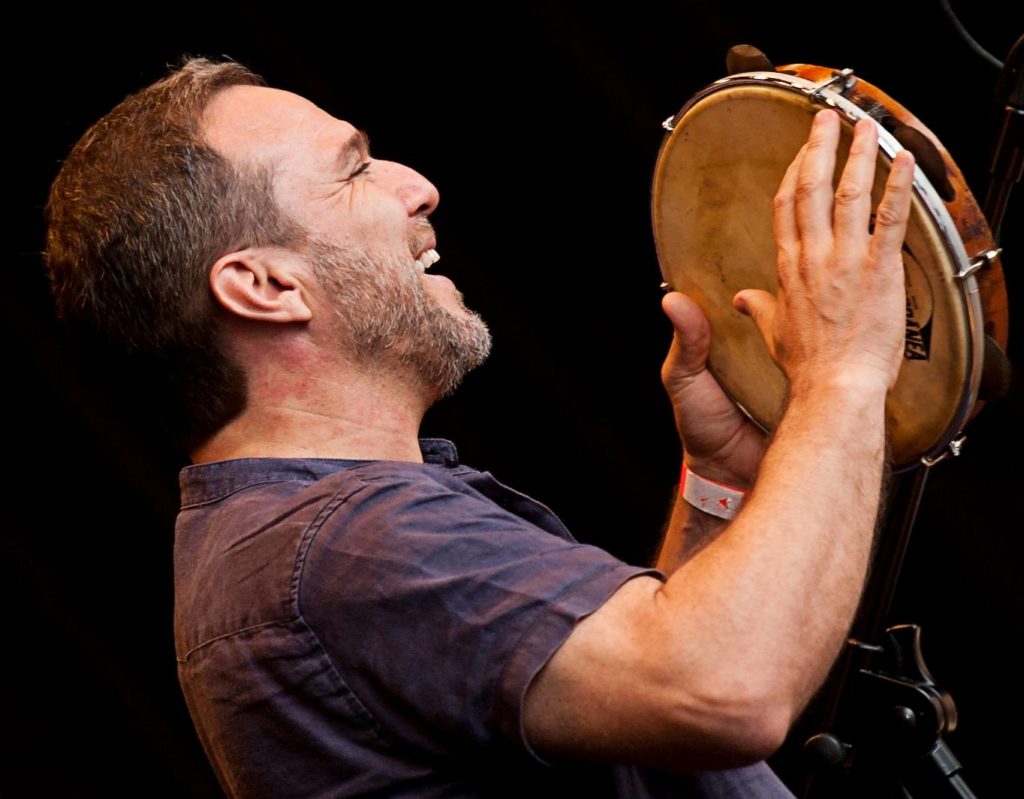
Ari Colares
Born in São Paulo in 1964, he is a musician and educator specialized in Brazilian percussion and rhythms. Ari has a master’s degree in music education from ECA-USP, the same institution where he earned his Bachelor’s degree in percussion.
His initiation and main training as an artist and educator took place in 1981, when aged 17 he joined a popular theatre group, which became a Folkloric Ballet (Abaçaí – Culture and Art), through research, experiences and production of shows focused on the diversity of Brazilian popular dances. Ari remained in that group for 25 years. From these experiences, he joined urban music groups, both from the MPB and instrumental music scenes.
Since 1990 he has performed constantly both in Brazil and abroad, teaching or playing with important names in creative music such as Naná Vasconcelos, Egberto Gismonti, Cesar Camargo Mariano, Yamandu Costa, André Mehmari, Gil Jardim, Ivan Vilela, Mônica Salmaso, Ceumar, Toninho Ferraguti, Zizi Possi, Caito Marcondes, Anelis Assumpção, André Abujamra, among countless others.
Since 2000, he has participated in numerous projects with the pianist Benjamim Taubkin – with whom he has traveled to several countries – including Clareira (repertoire of Brazilian Popular Culture with universal sounds and aesthetics), Al Qantara (collaboration between musicians from Brazil and Morocco) and Co-Bra Project (collaboration between musicians from Brazil and South Korea), América Contemporânea (collaboration between musicians from different Latin American countries) and Orquestra Popular de Câmara (a group that is inactive at the moment, but remains a reference for different generations of Brazilian musicians).
Since 2004 he has been part of the musical group A Barca, which experiences and dialogues aesthetically with different masters and forms of Brazilian Popular Culture music.
From 1993 to 2017, Ari taught Popular Percussion at Tom Jobim EMESP – School of Music of SP.
Currently, he also holds the position of Artistic Manager of Projeto Guri, teaches regular classes in his studio, in addition to courses and workshops in Brazil and abroad.
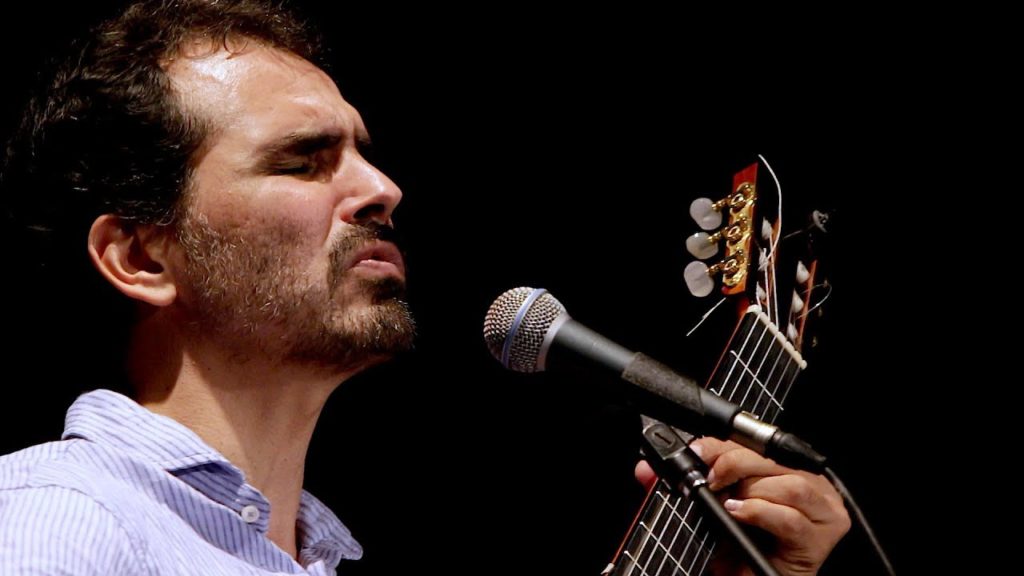
Chico Saraiva
In 1999, he released his 1st CD, the instrumental “Água”. He is a founding member of the group “A Barca”. Chico won the 6th Visa 2003 Award, and as part of the award recorded his CD “Trégua”, made up of songs – performed by singers – permeated with instrumental music. The 2005 relaunch of “Trégua” by Biscoito Fino was highly praised by European critics. In 2013, he released the CD “Tejo-Tietê”, in partnership with the singer Susana Travassos and produced by Paulo Bellinati.
In 2013 Saraiva completed his master’s degree in the music course at ECA / USP in “compositional processes”. His project based on interviews with master-musicians entitled “Guitar-Song: between solo guitar and Brazilian popular song”, was published as a book in 2018, based on the recommendation received by the panel composed of conductor Gil Jardim (advisor), Ivan Vilela and José Wisnik. The film resulting from this project “Guitar-Song: a Brazilian soul” – co-directed with Rose Satiko – is available on TV Sesc and Arte 1; and a website houses a large number of videos interwoven with the text of his dissertation. With the guitarist Daniel Murray, Chico completes the “Duo Saraiva-Murray”: their CD “Galope” (Borandá – 2016) is dedicated to Saraiva’s guitar compositions, with production by Paulo Bellinati.
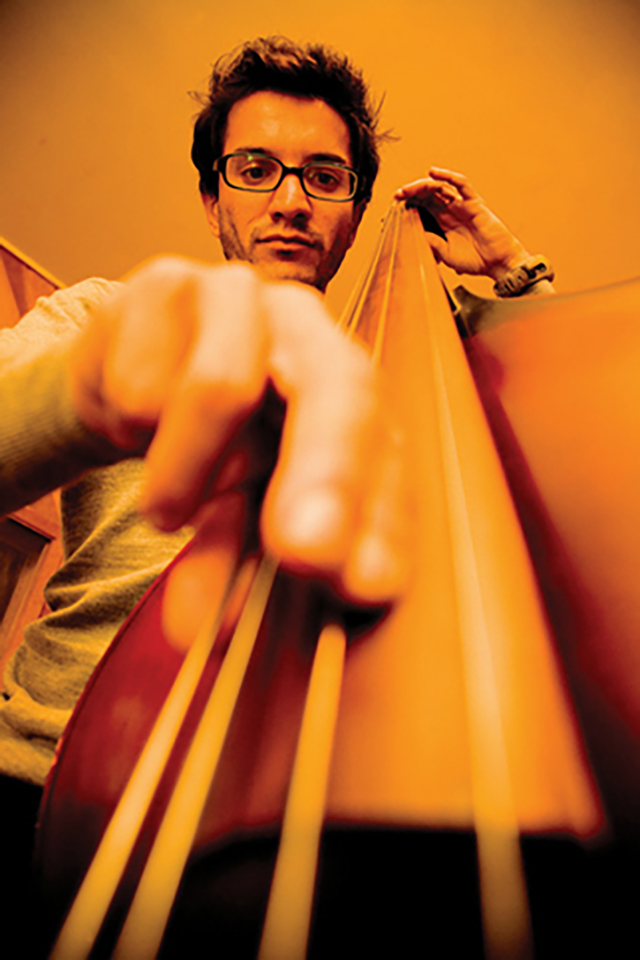
Meno del Picchia
Brazilian musician and anthropologist, born in Campinas (SP) in 1978. His work crosses the sound universe through art, academic research and musical production. Raised in Bragança Paulista, Meno lived on one side with his father’s family and the modernist heritage left by his great-grandfather Menotti Del Picchia, and on the other side, with catira, the viola song tradition played by maternal grandfather Zicão (who recorded an album in the 80s) and the traditional parties in the interior of São Paulo state.
He started his musical studies in the 90s with Leyve Miranda, founder of Groove – Curso Livre de Música. At that school, he developed jazz, improvisation and harmony, playing electric and acoustic bass. He also studied electric bass with Itamar Collaço, formerly Zimbo Trio, at Universidade Livre de Música (ULM), and classical acoustic bass with French teacher Tibault Delor, leader of the Tropical Double Bass Orchestra.
His first solo album “Meno Del Picchia” was released in 2009 within the authorial music project of Sesc Pinheiros, with instrumental songs and themes. In 2013, he released “Macaco Sem Pelo”, with songs between cumbia and rock, with support from the Secretariat of Culture of Bragança Paulista. Well received by the public and critics, he circulated through several SESCs and authorial music projects. In 2016, he was contracted by Proac to record “Barriga de 7 Janta”, his third album.
Macaco Sem Pelo was produced in the same period that Meno dedicated himself to a master’s degree in social anthropology from USP, with the title: “Why do they still record? Records and artists in action”. In research, Meno’s musical ethnography followed the creative processes of the composers Tatá Aeroplano, Kiko Dinucci and Rodrigo Campos. In 2020, he released his fourth album “Pele de Água”, while finishing his doctoral research in Social Anthropology at USP, investigating Funk in São Paulo.
In 2013, he also released the album “Interferências” with the instrumental trio Improvisado; and received with the trio and singer Ilana Volcov, the FUNARTE Award for Brazilian Music (2013). The award went to the Pelo Teletipo project, where they recreated songs and instrumental themes recorded in the 70s by artists little remembered today. He directed the original soundtrack for the film Bem Casados (2015), by Aluizio Abranches, with partners André Abujamra and Marcio Nigro.
In 2015, he was one of the instrumentalists invited to the artistic residency taught by Benjamim Taubkin, Jaques Morelenbaum and Marcos Suzano at the 14th Serrinha Art Festival, which included musicians from different parts of the world.
Between 2017 and 2019, he was musical director of the plays “Sutil Violento” and “Injustiça” of the CIA of Teatro Heliópolis. In the latter, he was nominated for the Shell Theatre Award in the musical direction category. He was a soundtrack teacher at the postgraduate course in Cinema, Video and Multimedia Photography at Faculdade Anhembi Morumbi between 2015 and 2017. He is a postgraduate professor in Popular Song at Faculdade Santa Marcelina.
As an instrumentalist, he also integrates the projects of Otto, Guizado and Anaí Rosa among others. He was a member of the improvised instrumental trio, of the bands Afroelectro and Druques. Meno has also played with several other artists such as Karina Buhr, Tulipa Ruiz, Alessandra Leão, Ricardo Herz, Bocato, Diddier Lockwood, Mc Sombra, Metá-Metá, Passo Torto, Peri Pane and Gustavo Galo.
Pesquisadores
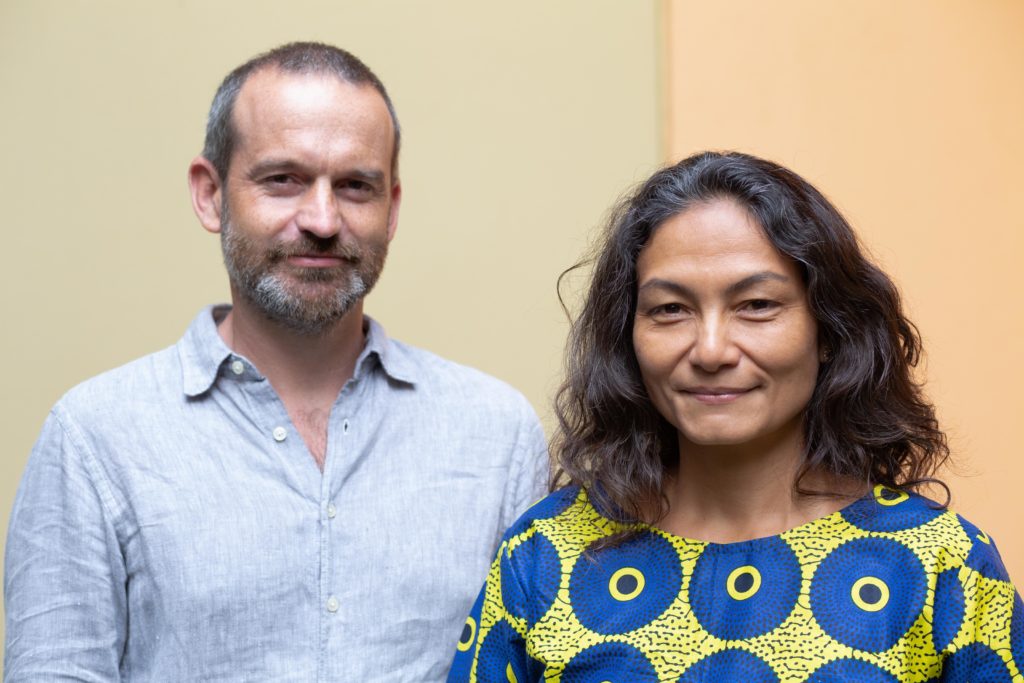
Rose Satiko Gitirana Hikiji
Brazilian anthropologist and documentary filmmaker, granddaughter of Japanese immigrants who arrived in São Paulo in the 1930s and of people from Sergipe with indigenous, African and European roots. Professor at the Department of Anthropology of the School of Philosophy, Letters and Human Sciences of the University of São Paulo. Coordinator of the Image and Sound Laboratory in Anthropology (LISA-USP). Author of the books Filming or Music – Essays on Shared Anthropology (2025), Image-Violence – Ethnography of a Provocative Cinema (2013) and Music and Risk (2006), co-author of Lá do Leste (2013), co-organizer of The Experience of the Image in Ethnography (2016), Bixiga in Arts and Crafts (2014), Anthropology and Performance (2013), Writings of the Image (2004) and Image-Knowledge (2009). He has directed or co-directed several ethnographic films, including São Palco – an Afropolitan City (2023), Afro-sampas (2020), Woya Hayi Mawe – Where are you going? (2018), Tabuluja (2017), Guitar-Song: A Brazilian Soul (2016), The Eagle (2015), Fabrik Funk (2015), Art and the Street (2011), Cinema de Quebrada (2008). He is developing the research “Being/becoming African in Brazil: Making music and African cultural heritage in São Paulo”, in partnership with Jasper Chalcraft.
Jasper Chalcraft
is a British anthropologist and heritage specialist who works with universities in the UK, Italy and Brazil, and with partners across the museum and arts sectors. His publications include The Making of Heritage: seduction and disenchantment, co-edited (with Camila del Mármol & Marc Morell); “Collaborative post-production” (with R. Hikiji in P. Vaninini, ed. The Routledge International Handbook of Ethnographic Film and Video); “Beyond Addis Ababa and Affile: Italian public memory, heritage and colonialism” (RSC Working Papers); “Opening Eyes through Ears: migrant Africans musicking in São Paulo” (with R. Hikiji in Reily & Brucher, eds. The Routledge Companion to the Study of Local Musicking); “Decolonizing the site: the problems and pragmatics of World Heritage in Italy, Libya and Tanzania” (Berliner & C. Brumann, eds. World Heritage on the Ground: ethnographic perspectives); and “Space is the Place: the global localities of the Sónar and WOMAD music festivals” (with P. Magaudda in L.Giorgi et al., eds. Festivals and the Cultural Public Sphere). Jasper is co-director of São Palco – An Afropolitan City (2023), Afro-Sampas (2020), Woya Hayi Mawe – Where are you going to? (2018) and Tabuluja (Wake up!) (2017), nominated for the AHRC Research in Film Awards 2017, and with Rose Satiko Hikiji conducts the research project “Being / Becoming African in Brazil: Making music and African cultural heritage in São Paulo”.
